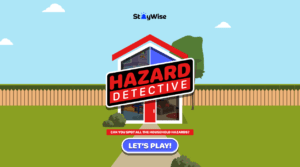Maths – Equal Groups
In maths, we’ve begun our multiplication and division learning.
Our focus this week has been equal and unequal groups. Equal groups contain the same number of items; unequal groups do not.
The children have enjoyed making equal groups with multilink cubes.



Help at home by looking for equal groups in the world around us. How many groups are there? How many are there in each group? How many are there altogether?
Science – Habitats
In science, we’re biologists! We’re learning about animals and their habitats.
This week, we’ve learned about polar habitats and desert habitats, using secondary sources to conduct research and create some animal fact files.



Help at home by exploring some animal facts. The National Geographic Kids website is fantastic!
Living and Learning – Internet Safety Workshop
Today, we were lucky to welcome Dave from d:side for an internet safety workshop.
Here are a few things we learnt:
- Lots of different devices can be used to access the internet, even fridges and kettles!
- 2 billion people around the world access the internet every day.
- Everyone can see what you upload to the internet.
- Not all videos on Youtube are suitable for all ages. Use YouTube Kids to stay safe.
- Games use number ratings to help us to know which games are suitable for our age.
Dave was really impressed by the children’s knowledge and made special mention to their focus and engagement. Well done, Year 2!
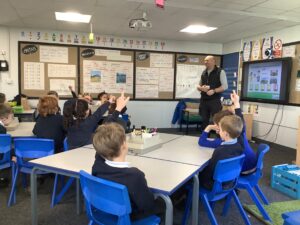

Help at home by discussing internet safety with your child. Do you have any rules for staying safe on the internet at home?
An unscheduled visit…
Last week, we explored our locality as part of our geography topic, conducting fieldwork to study the geography of our school and its surrounding environment.
As we reached the fire station to survey the traffic, recycling bins and litter, Mr Nash rang the doorbell…
Please can we have a look at your fire engine?
Moments later, the shutter opened and out drove the shiny, red fire engine!
The team at Wetherby Fire Station were so generous with their time, giving the children a tour of the vehicle and its tools, providing lots of opportunities to ask questions. The children really enjoyed the experience and asked some fantastic questions, representing our school fantastically with their impeccable manners.



Thank you to everyone at Wetherby Fire Station for being so accommodating with our unscheduled surprise visit. A lesson in “if you don’t ask, you don’t get.”…

Help at home by discussing what firefighters do to help in our community. Watch and discuss this video from West Yorkshire Fire and Rescue.
Reading – Sequencing and Summarising
In reading and writing, our focus text is Flooded by Spanish author and illustrator, Mariajo Ilustrajo.

We’ve really enjoyed this text, exploring the key themes by asking questions and making connections.
A theme is a big idea or message.
Flooded is a funny tale of animals in a slowly flooding city. Behind the humorous story and illustrations, there’s an important message. Flooded touches on themes of environmental crisis and responsibility, as well as the power of community, and working together to fix a problem.
We’ve used the text to practise our summarising skills – summarising is retelling a story in your own words.
The children impressed me with their skills, sequencing pictures from the story and writing a summarising sentence for each.

Help at home by inviting your child to summarise Flooded. Can they tell you about the key themes? Try sequencing and summarising events in a different text. What happened first? What next? What happened at the end?
Living and Learning – I can assess my own risks
In Living and Learning, we’re learning about staying safe. This week, our statement is:
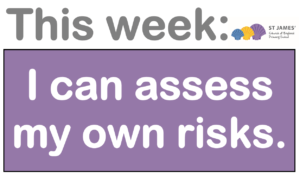
We began by discussing some key vocabulary:
danger – a cause of harm or injury
safety – keeping free from harm or danger
risk – the possibility of something dangerous happening
We spent some time thinking about times we’ve been exposed to risk, how we assessed them and the measures we took to stay safe? We thought specifically about our recent trip to Lotherton Hall.
Risk – getting lost
How did we stay safe? – stayed with our group
Risk – crossing the road
How did we stay safe? – checked for cars, walked in pairs with adult supervision
Risk – animals biting us
How did we stay safe? – not poking our hands through the railings
Risk – slipping on ice in the playground
How did we stay safe? – walking
How can we stay safe at home?
Here are some top tips from the children for staying safe at home:
Stay away from cleaning products. Ask a trusted adult for help. Woody
Don’t play near fire. Poppy
Keep soap away from your eyes. Vallan
Don’t touch plugs. Alfie
Only use sharp knives with adult supervision. Ariella
Help at home by trying this hazard detective game.
Can you come up with top 5 tips for staying safe at home?
Science – Lotherton Hall
On Tuesday, we donned our high vis jackets and biologist hats to visit Lotherton Hall’s Wildlife World. Year 2 represented St James’ brilliantly and thoroughly enjoyed their day out.
We started our day with a workshop about animals and habitats. The children were invited to work like biologists by observing some replica skulls, comparing their teeth before pondering what this might tell us about their diet – the carnivores had sharp teeth; the herbivores flat, rough teeth. We learnt about a variety of animals, including penguins, snakes and tapirs.
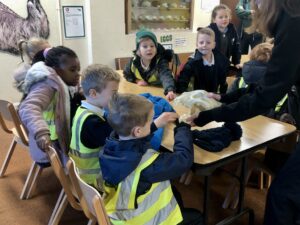

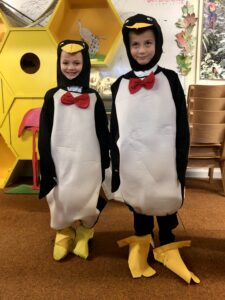
After the workshop, we explored the zoo. The children were fascinated by a range of animals from around the world. We were particularly enamoured by the penguins and the exploits of Arthur the tapir…
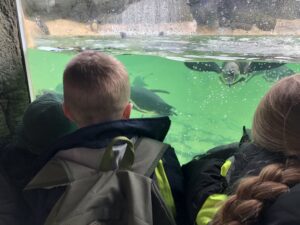

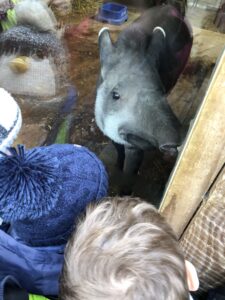
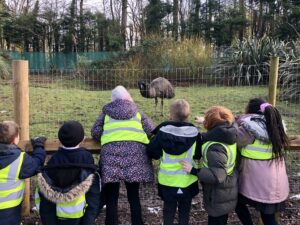
We had a fantastic day out and the children have returned to school with oodles of animal knowledge! This visit prepares us for our next science unit: Animals – Habitats

Help at home by inviting your child to recount their day at Lotherton Hall (Can they use time adverbials? e.g. First, Next, Then, After that, Finally). Can your child remember the habitats we learnt about in the workshop? Encourage your child to work like a scientist by asking questions – what would you like to find out about animals and their habitats?
Living and Learning – I know what a drug is
Our Living and Learning statement this week is:
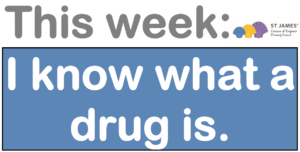
“A drug is a substance that changes the way the body or mind works.”
The children began by sharing what they already know about medicines.
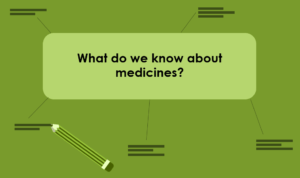
Not all medicines help your health.
Medicines help you to recover when you are ill. To recover is to get better.
Drugs can change your attitude. They can make you angry and some drugs are illegal.
Some drugs can make your body stronger – some people use them to cheat in sports.
Some people need to get medicine every day.
We get medicine from the doctor.
You keep drugs safe by keeping them somewhere children can’t reach.
You can try and help yourself by eating healthily and exercising before taking medicine.
I was so impressed by the children’s previous knowledge of medicine!
Helping someone to feel better
We spent some time thinking about times when we were ill or felt unwell and the things that helped us to feel better.
- rest
- water
- medicine from the doctor
- warm drink
- eating healthy food
- plasters
There are lots of different types of medicine and they’re all useful for different things. Some of them go in the body and others on the body. Some can be bought at the shop by a responsible adult; others have to come from the doctor.
Who can help?
We thought about the people who can help us to stay healthy and well. The children demonstrated fantastic knowledge of people in their communities who can help.
- parents and family
- carers
- doctors
- trusted adults at school
- police
- paramedics
- air ambulance
- mountain rescue
- yourself – keep safe and protect yourself
If you feel unwell, it is important to talk to a trusted adult at home or school. Only a trusted adult should give you medicines.

Help at home by discussing the safety measures you have in place around medicine at home. Invite your child to demonstrate their learning by having a go at this task:

Thank You!
The Autumn term has surpassed my expectations in so many ways. Our Year 2 children have applied themselves in every aspect of their learning and have represented our class and school brilliantly.
They have embodied our school vision, helping to make our school a happy and healthy place to achieve and believe.
Thank you for all your continued support. Wishing a merry Christmas to those who celebrate and a very happy New Year.
Help at home by enjoying a restful break… we’ve all earned it!

Topic – Pointillism
In topic this half term, we’re artists/artist historians.
We’ve been exploring the work of Georges Seurat, a French painter known for pointillism – painting lots of tiny dots and dashes to make up a larger image. When you look closely, it looks like a group of coloured dots, but as you move further away, the bigger picture becomes clearer.
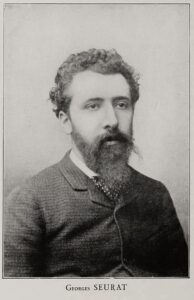
One of Georges Seurat’s most famous works is A Sunday on La Grande Jatte. It’s 3 metres wide and took him 2 years to finish! We’ve really enjoyed discussing the painting, thinking about the visual and tactile elements of art. We’ve thought carefully about:
colour
space – distances or areas in a piece of art; usually used to describe areas or parts of an artwork where there are large blocks of colour or ‘gaps’
composition – the way that something has been deliberately ‘put together’
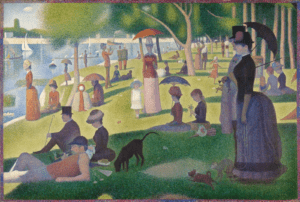
After some extensive discussion, we doffed our art-historian hats and settled in as artists…
The children used earbuds and paint to create their own pointillism art. I was impressed by the patience and perseverance on display.
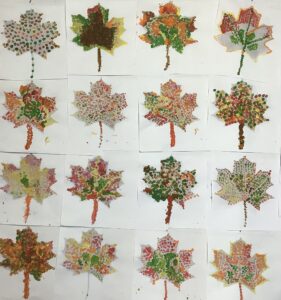
Help at home by exploring the Art Bites YouTube channel with your child. Make sure to stay safe online.
Why not try some pointillism at home? All you’ll need is some paint and a few earbuds… and patience!
